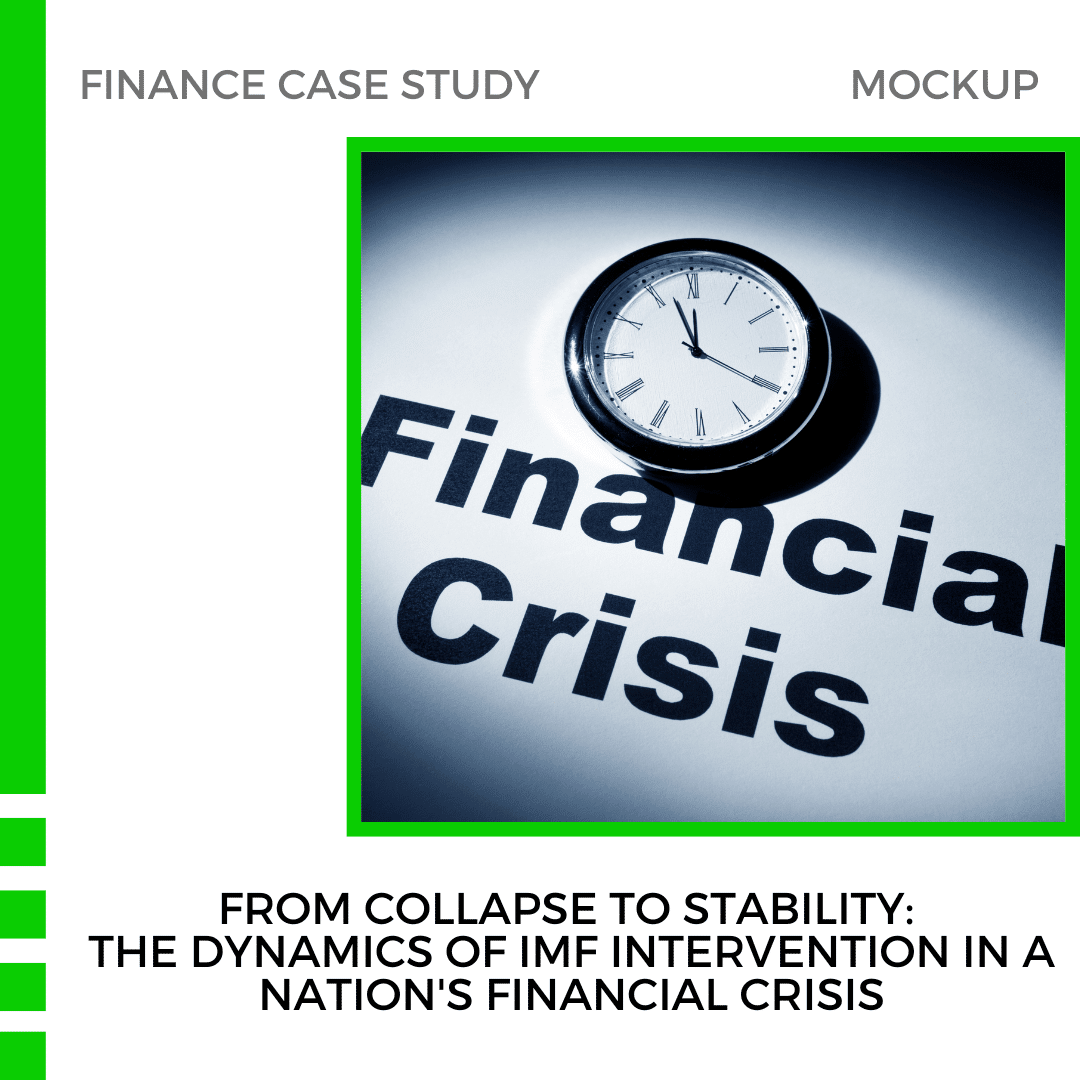
From Collapse to Stability: The Dynamics of IMF Intervention in a Nation’s Financial Crisis
Introduction
This case study explores the financial crisis faced by the fictional country, Economica, which compelled the government to seek a loan from the International Monetary Fund (IMF). It examines the factors that led to the crisis, including poor governance, economic mismanagement, and political instability. The analysis will cover the conditions imposed by the IMF loan, the immediate economic and social impacts, and the long-term implications for Economica’s development. Students are tasked with evaluating the root causes of the crisis, assessing the IMF’s intervention, and proposing sustainable strategies for recovery.
Background of Economica
Overview of Economica
Economica is a developing nation with a mixed economy comprising agriculture, manufacturing, and services. Despite the potential for economic growth, the country has long struggled with corruption, weak public institutions, and policy inefficiencies. The absence of political stability further hindered efforts to establish fiscal discipline and pave the way for the financial crisis.
Pre-Crisis Economic Indicators
Before the financial crisis, Economica displayed several warning signs, such as:
- High public debt: Debt levels reached unsustainable limits, with a significant share of borrowing from external sources.
- Large fiscal deficit: The government’s expenditure consistently outpaced revenue, contributing to budgetary imbalances.
- Current account deficit: A heavy reliance on imports combined with underperforming exports widened the current account deficit.
- Dependency on foreign investment: Foreign direct investment (FDI) and remittances were key drivers of economic stability, making the country vulnerable to external shocks.
Key Events Leading to the Financial Crisis
Decline in Commodity Prices
The economy of Economica is mainly dependent on the export of agricultural products and raw materials. A sudden decline in global commodity prices reduced export earnings, deepened the trade deficit, and strained public finances.
Political Instability
Political instability, marked by frequent government changes, causes uncertainty in policy-making. This erodes investor confidence and triggers capital flight, further depleting the nation’s foreign exchange reserves.
Fiscal Mismanagement and Corruption
The government’s fiscal policies were poorly managed, characterized by unchecked public spending, excessive borrowing, and weak financial controls. Public funds were often diverted through corrupt practices, exacerbating the country’s financial crisis.
IMF Intervention
Request for IMF Assistance
Economica turned to the IMF for financial assistance, as the country was on the brink of default and facing severe liquidity challenges. The IMF provided a bailout package to restore stability and rebuild investor confidence.
Conditions of the IMF Loan
The IMF loan came with strict conditions aimed at addressing the underlying causes of the financial crisis:
- Fiscal Austerity: Implementing austerity measures, including cuts in public spending and elimination of subsidies.
- Structural Reforms: Enhancing public sector governance, reducing corruption, and improving administrative efficiency.
- Monetary Policy Adjustments: Tightening monetary policy to control inflation and stabilize the national currency.
- Trade Liberalization: Removing barriers to trade and foreign investment to stimulate economic growth.
Immediate Impact of the IMF Loan
Economic Stabilization
The IMF’s assistance helped stabilize Economica’s foreign exchange reserves, allowing the government to meet international obligations. However, the austerity measures triggered immediate economic and social challenges.
Social Unrest
The reduction in public spending and removal of subsidies led to widespread protests. Citizens voiced discontent over rising unemployment, increased costs of living, and reduced access to essential services.
Inflation Control
Monetary tightening succeeded in curbing inflation, but it also led to higher interest rates. As borrowing became more expensive, businesses struggled to access credit, stifling economic activity.
Long-Term Implications of the IMF Intervention
Economic Reforms and Governance
The structural reforms introduced by the IMF aimed to address long-standing governance issues. However, these measures met resistance from powerful political groups that benefited from the status quo.
Debt Sustainability
While the IMF loan provided short-term relief, Economica needed to adopt sustainable fiscal policies. This required improving tax collection, curbing wasteful spending, and diversifying the economy to reduce reliance on external borrowing.
Growth Prospects
Efforts to attract foreign investment through trade liberalization were crucial for future growth. However, these initiatives depended on creating a stable political environment and addressing structural bottlenecks in infrastructure and workforce skills.
Tasks for Students
- Root Cause Analysis:
Examine the factors contributing to Economica’s financial crisis, including global economic conditions, fiscal mismanagement, and political instability. - Evaluation of IMF Conditions:
Analyze the effectiveness and consequences of the conditions imposed by the IMF loan on Economica’s economic recovery against the financial crisis. - Stakeholder Analysis:
Identify key stakeholders, including government agencies, businesses, and citizens, affected by the financial crisis and reforms and evaluate their interests and concerns. - Alternative Solutions:
Propose alternative strategies to complement the IMF’s conditions, focusing on protecting vulnerable populations and promoting inclusive growth. - Long-Term Strategy:
Develop a sustainable recovery plan for Economica, incorporating economic diversification, governance reforms, and social equity.
Possible Solutions for Economica’s Financial Crisis
1. Strengthening Fiscal Discipline
Economica must establish sound fiscal policies to prevent future crises. Key measures include:
- Improving tax collection and compliance.
- Reducing unnecessary public expenditures.
- Introducing transparent budgeting processes to curb corruption.
2. Promoting Economic Diversification
Reducing the economy’s dependence on a few sectors is essential. Economica should invest in new technology, renewable energy, and tourism industries. Developing a resilient tourism sector, focused on eco-tourism and sustainable practices, can attract foreign exchange while mitigating environmental impact.
3. Social Protection Programs
To address the social impact of austerity measures, the government should expand safety nets such as unemployment benefits, food subsidies, and healthcare services. Job retraining programs can help displaced workers transition to new sectors.
4. Attracting Foreign Investment
Creating an investor-friendly environment is critical for economic recovery. The government should streamline business regulations, improve infrastructure, and enhance political stability to attract FDI.
5. Strengthening Governance and Anti-Corruption Measures
Public sector reforms are necessary to restore trust in government institutions. Strengthening anti-corruption frameworks and promoting transparency in financial management will ensure more effective use of public resources.
6. Regional and Global Partnerships
Collaborating with regional trade blocs and international organizations will help Economica access new markets and benefit from technical expertise. Tourism partnerships, especially with neighbouring countries, can enhance regional tourism and reduce vulnerabilities to global disruptions.
Conclusion
The case of Economica illustrates the complex interplay between economic policies, governance challenges, and social stability during a financial crisis. The IMF loan provided temporary relief but imposed harsh conditions that triggered significant social unrest. A comprehensive recovery strategy must combine fiscal discipline, economic diversification, and governance reforms. Economica can achieve sustainable growth and avoid future crises by balancing austerity with social protection and investing in new industries.
References
- International Monetary Fund (IMF) – Financial Assistance
- World Bank – Debt Sustainability
- OECD – Governance and Anti-Corruption
- Brookings Institution – Economic Recovery
- UNWTO – Sustainable Tourism
These sources provide further insights into managing financial crises, governance reforms, and sustainable recovery strategies.
Explore Business Models of Global Companies and Indian Companies



